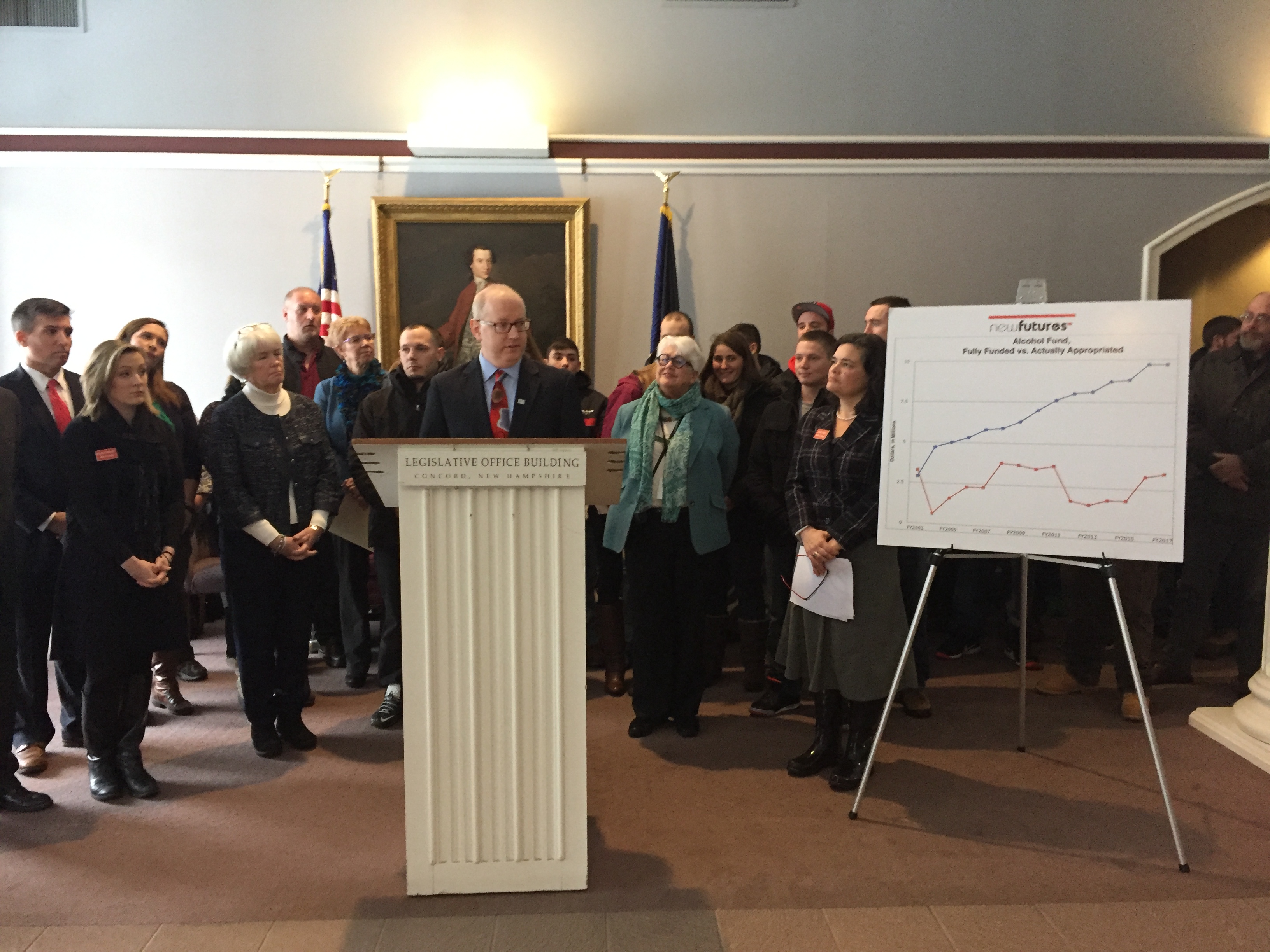Advocates Say Fully Financing NH Alcohol Fund is Crucial To Stopping Opioid Crisis

Despite several inches of snow in most parts of the state, substance abuse prevention advocates and recovering addicts made the trek to the State House to show support for a bill that would be able to fund more recovery programs in the Granite State.
“What are we waiting for?,” deputy director at New Futures Kate Frey asked at a Tuesday press conference. New Futures is a nonprofit advocacy organization looking to prevent and reduce substance abuse in the New Hampshire. According to her, the state is suffering a serious epidemic and needs creativity to get out of it.
One of those creative solutions unique to New Hampshire and endorsed by New Futures should be fully funding the state’s Alcohol Fund.
The New Hampshire Alcohol Fund was created in 2000 as a non-lapsing and continually appropriated fund to support alcohol and drug education, abuse prevention, and treatment programs. The law provides 5 percent of the gross profits from the sale of alcohol to support such programs. The funds would be allocated to the Governor’s Commission on Alcohol and Drug Abuse Prevention, Intervention, and Treatment to pay contracts for service providers in the communities hardest hit by opioid abuse.
The fund began during the 2003-2004 biennium and was fully funded in that budget. But every year since, the 5 percent funding has been suspended by either the governor or the legislature, and revenue transferred to the General Fund. In the subsequent years, the legislature appropriated only a small amount of general funds — significantly less than the 5 percent that was mandated by law for prevention and treatment.
The 2016-2017 state budget allocated only 1.7 percent to the Alcohol Fund. That total amount equated to about $6.6 million, instead of the $19 million had the fund received the total 5 percent. In the previous legislative session, lawmakers allocated an additional $2.5 million from the General Fund for prevention, treatment, and recovery in 2017, bringing the total to $9.1 million.
But a bill in the Senate would fully fund the Alcohol Fund for the 2017-2018 biennium at the 5 percent rate. At a hearing for Senate Bill 166 on Tuesday before the Senate Finance Committee, prime sponsor Sen. Jay Kahn, D-Kenne, said if the state is going to be serious about addressing the opioid crisis by focusing on prevention, intervention, treatment, and recovery, then legislators should be doing everything possible to get ahead of the problem.
“Where we invest our money is a direct reflection of our priorities, and our priorities ought to be with people in New Hampshire who need care,” he said. Kahn also called for creative ways to fight to crisis with “yankee ingenuity.”
But it might not be an easy task to convince the Legislature that this is a worthwhile endeavor.
In the last biennium budget, lawmakers approved $42 million in substance abuse funding. Former Gov. Maggie Hassan was criticized for originally vetoing the budget, delaying the appropriation of the funds by three months. The total amount was $14 million more than the 2014-2015 budget. During the legislative session, lawmakers approved at least $5 million in additional funding.
Some legislators on the Senate Finance Committee were concerned that the state has already spent a significant amount of money, yet didn’t seem to fix anything.
“If we just throw money at the problem, we don’t necessarily solve the problem,” Sen. Bob Giuda, R-Warren, said.
Gov. Chris Sununu is scheduled to release his budget proposal for the 2018-2019 biennium on Thursday, so it remains to be seen how much money he’s putting towards the opioid crisis or if he plans to fully fund the Alcohol Fund. During his bid for the corner office, Sununu and his Democratic challenger Colin van Ostern said they supported returning the Alcohol Fund to 5 percent.
In his inauguration speech, Sununu said getting the opioid crisis under control was the state’s top priority.
“I believe we need to start in the beginning in terms of our schools,” he said on January 5. “Aggressive prevention programs in our schools that start earlier, that are more aggressive. And I think we need to start bringing in the parents and the stakeholders into those programs. There is a different path for everybody and we need to be open to all the paths. We need to put resources behind our words and take real action.”
NH Journal previously reported fully funding the Alcohol Fund had bipartisan support among most of the gubernatorial candidates. And when the fund was first debated in 2000, it received widespread, bipartisan support in the House and Senate. Former Gov. Jeanne Shaheen vetoed the original legislation establishing the Alcohol Fund, but a two-thirds majority in the House and Senate overrode her veto, so it has the potential to appeal to lawmakers on both sides of the aisle.



